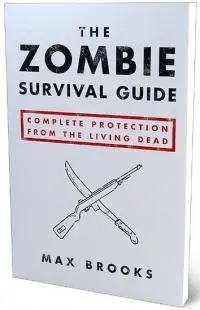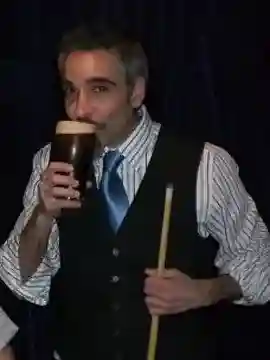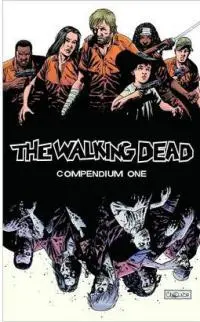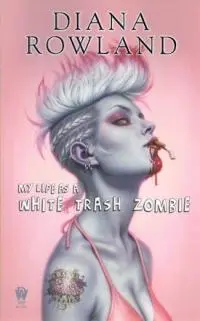Easter just came (and went) and call me blasphemous, but the holiday always makes me think of zombies. I mean, sure, Jesus came back all intact and full of wisdom, but not everyone does. In the majority of cases, when someone comes back from the dead, they come back rotting and mindless and with a hunger for brains.
And when I think of zombies, I think of how the genre has endured. There are those that are sick of zombies, along with vampires and werewolves and other horror tropes, but there’s no doubt that zombies are still popular. AMC’s The Walking Dead is a powerhouse on television. Warm Bodies just took zombies into the romance genre. Books, games, and movies about zombies continue to be produced and, more importantly, to sell.
What is it about zombies that they remain so popular?
 I think it's still the case that zombies are scary. And one of the reasons zombies are scary is that zombies are us. Sure, there’s the fear of being bitten, of dying, but even worse, there’s the knowledge that if that happens, you will come back as one of them. That everything that makes you you—your mind, your personality— will be gone, and you will be a shambling inhuman thing with an inhuman hunger. You may become a threat to your friends or loved ones. Or them to you, transformed into mindless, hungry corpses.
I think it's still the case that zombies are scary. And one of the reasons zombies are scary is that zombies are us. Sure, there’s the fear of being bitten, of dying, but even worse, there’s the knowledge that if that happens, you will come back as one of them. That everything that makes you you—your mind, your personality— will be gone, and you will be a shambling inhuman thing with an inhuman hunger. You may become a threat to your friends or loved ones. Or them to you, transformed into mindless, hungry corpses.
Then there's the zombie apocalypse, which usually is all about survival. In most zompocalypse scenarios, the end is inevitable. What matters is how you stretch out your time in a horrific world. Perhaps most interesting about these scenarios is the slow loss of humanity among the survivors who often become monsters themselves.
Max Brooks, author of The Zombie Survival Guide and World War Z says of zombies in a Time interview:
Zombies are apocalyptic. I think that’s why people love them because we’re living in, not apocalyptic times, but I think we’re living in fear of the apocalyptic times.
He goes on to say:
When I started writing, there was nothing about zombies. It was all teen movies, which to me are scarier than zombies, but that’s another story. I think now, people need a sort of safe vessel for the end of the world. You can read The Zombie Survival Guide or watch Dawn of the Dead and then go to bed saying, ‘Oh, it’s just zombies.’
Try doing that with The Road by Cormac McCarthy. Nuclear war can really happen. I think zombies are safe. Zombies are manageable. You can’t shoot the Gulf oil spill in the head. I think some of these problems are too big and too tough to understand. What does the global financial meltdown of 2008 mean? I can’t explain it, and I sure know you can’t shoot it in the head.
[...]
I think that what’s so scary about them is their lack of a middle ground. You can’t negotiate with them. They’re like a disease.
And that rings true for me in a lot of ways. Zombies tap into our apocalyptic fears, and they’re both a comforting and disturbing threat at the same time. Comforting because we know all about them—they’re slow and shambling, a head shot will kill them—but disturbing because, as mentioned, you can’t reason with them. They are vessels of hunger. And they will feed until every living creature is gone.
Of course, the zombie trope has spun off its own offshoots. Not everyone is writing about mindless, shambling zombie hordes anymore. Two of the novels listed below have thinking, reasoning zombies. The same tack was taken with the recent movie, Warm Bodies (based on a novel by the same name). Zombies have become a way of offering commentary on our society, a form of satire.
There are plenty of zombie books out there (including the aforementioned Max Brooks books) but I’ve highlighted five that I think are great examples or compelling or fun or all three.
The Living Dead
When it comes to short fiction, there are plenty of zombie anthologies out there. Just search on Barnes & Noble or Amazon and you’ll see how many. For my money, though, one of the best collections of zombie stories is The Living Dead, edited by John Joseph Adams. The anthology includes stories from Stephen King, George R. R. Martin, Harlan Ellison, Neil Gaiman, Clive Barker, Jeffrey Ford, and more. A follow-up, The Living Dead 2, was also published. A great choice if you want just one zombie anthology.
![]() The Walking Dead
The Walking Dead
I mentioned the popularity of the television series (which I watch and enjoy), but I’m referencing the comic series here. As of this writing, the series has 108 issues and is still going strong. The series can sometimes be gratuitous (a trait common to many zombie stories) but Robert Kirkman manages to keep the tension going and he does some horrible things to his characters (something that I enjoy). The art by Tony Moore and Charlie Adlard is simple, but helps convey the setting very well. The television series has diverged from the comic series, so both can be enjoyed independently.
Breathers: A Zombie's Lament
In this book by S. G. Browne, zombies are less mindless and more like they were in life, only despised and shunned by the rest of society. When Andy Warner comes back as a zombie, he has to deal with this lack of acceptance before finding a place in Undead Anonymous. There he meets Rita, another zombie who came back after killing herself. Here's a little sample:
I don’t know what I intended to accomplish by dumping the entire contents of the freezer onto the kitchen floor, but I figure it would probably be a good idea to try to put back what I can and clean up the rest of it before my parents wake up. But when I open the freezer, I discover there’s not any room.
My parents are in the freezer. I can see hands and legs and feet and my father’s face staring out at me from the second shelf. His head is in a large Ziploc freezer bag, as are the rest of my parents’ body parts. Or most of them. When I open the refrigerator, my parents are in there, too.
All the wine I’ve drunk is suddenly trying to find its way back into the bottle and I barely make it to the sink before I throw up. Actually, it’s more like reverse drinking. Just wine and a little stomach acid. But no chunks of Mom or Dad.
Our relationship wasn’t always like this.
Sure, there were the standard growing pains and disagreements most parents and sons encounter.
Hormones.
Independence.
Latent Oedipal desires.
But when your only son reanimates from the dead, it creates an entirely new dynamic that your average parents just aren’t prepared to handle.
![]() My Life as a White Trash Zombie
My Life as a White Trash Zombie
Diana Rowland's book takes the same approach as S. G. Browne's in making her zombies less mindless and having to fit in with modern society while dealing with their hunger for flesh. Angela Crawford lives in the swamps of Southern Louisiana and is a dropout and an addict. When she becomes a zombie, her addictions disappear, but other problems present themselves. And there’s a mystery! A sequel, Even White Trash Zombies Get the Blues, is also available.
Nick stuck his fingers in the widened gap and pulled. The top of the skull came off with a tearing, sucking sound, and suddenly there before me were the grey and pink convolutions of a brain.
“There ya go,” he said with a silly little flourish as he pulled his mask and face shield off. “Your first time seeing a real live brain.” Then he sniggered. “Real dead brain, that is.”
I followed his lead and pulled my mask off, then froze. All of a sudden it seemed as if I could smell the brain, and not in a oh-how-gross way, but as if someone had taken the lid off a pot of gumbo to let the aroma fill the room. And I knew it was the brain that smelled so utterly enticing—knew it with every single cell of my being.
What the hell was wrong with me?
To my shock and horror my mouth began to water and my stomach gave a loud growl—loud enough for the others to hear. Both of them turned to look at me and Dr. Leblanc gave a laugh. “Okay, you’re officially the toughest morgue tech who’s ever worked here if you can still be hungry during an autopsy!”
I gave a weak laugh in answer as I struggled to hide my confusion. Yeah, that’s all it was. I was just starving.
So why did I have the horrifying urge to grab a handful of that pink and grey mass and shove it into my mouth like movie popcorn?
Portlandtown
I recently became aware of this novel, but if you read my Weird Western column last month you’ll understand part of what draws me to it. An old marshal is invited to come live with his family in Portland, Oregon--his daughter Kate, his son-in-law, the blind Joseph Wylde (who can still manage to see) and their children. What follows involves necromancers, magic guns and, of course, zombies. Author Rob DeBorde even throws in a few steampunk elements to boot. I haven’t finished this one, but it seems like a lot of fun.
In his dream, Joseph Wylde wakes to the sound of a baby crying—his baby, his daughter. It’s steady, in distress, and not alone. Also crying, softer, but in sync with his sister, is a baby boy. Joseph has a son and a daughter. Twins.
Before Joseph can rise from his bed, pain screams from behind his eyes. His hands instinctively reach for his face, but stop short. He knows what to expect but is still surprised to find a cloth about his head, laid over his eyes. Someone has seen fit to bandage him, or perhaps to cover that which should not be seen. Joseph is blind, has been for five days, thanks to—
Your children are crying, Joseph.Joseph stands, steadying himself against a wall he knows he can’t see—but he can. This is his room, the small corner bedroom on the second floor of the marshal’s home. He can feel the loose floorboard just beyond the edge of the bed, hear the wood groan as he steps off—was it ever so loud? To his left there’s a small nightstand, and then, three paces, a door. He searches for the handle, but finds none. It’s open. He knows he can’t see this—but he can.
In the hallway, the crying is louder and there’s something else: creaking, back and forth. Someone is sitting in his father-in-law’s old rocking chair, the one Joseph repaired after Kate cracked one of the legs. She was going to give birth to a giant, he’d teased her, a bear of a child. Kate said there would be two. She had known, even then.The crying keeps time with the old wood, as if in motion, closer and then farther away. Joseph is halfway down the stairs before realizing he’s begun the descent. He opens his mouth, not entirely sure what will come out.
“Kate?”Joseph hears the shallow gasp as it catches in his wife’s throat. The creaking doesn’t stop. He reaches the landing.
The stench of the man hits Joseph’s nostrils, a mixture of sweat, worn leather, and gun oil. Stronger still is the scent of blood—not of the man, but other men … dead men.In his dream, Joseph hears the sound of metal slide across leather as the Hanged Man draws the red-handled gun from its holster. His eyes don’t see the bastard set the barrel of the pistol across his daughter’s skin—but he can see it.
What do you think of zombies? Like them? If so, what draws you to them? And what are your favorite zombie stories (books, movies, etc)? If not, I’d love to hear why as well. Please sound off in the comments. And remember...aim for the head...
image by BrainTreeStudios

About the author
Rajan Khanna is a fiction writer, blogger, reviewer and narrator. His first novel, Falling Sky, a post-apocalyptic adventure with airships, is due to be released in October 2014. His short fiction has appeared in Lightspeed Magazine, Beneath Ceaseless Skies, and several anthologies. His articles and reviews have appeared at Tor.com and LitReactor.com and his podcast narrations can be heard at Podcastle, Escape Pod, PseudoPod, Beneath Ceaseless Skies and Lightspeed Magazine. Rajan lives in New York where he's a member of the Altered Fluid writing group. His personal website is www.rajankhanna.com and he tweets, @rajanyk.
 The Walking Dead
The Walking Dead
 My Life as a White Trash Zombie
My Life as a White Trash Zombie








